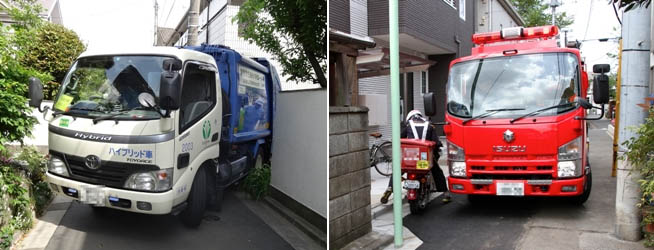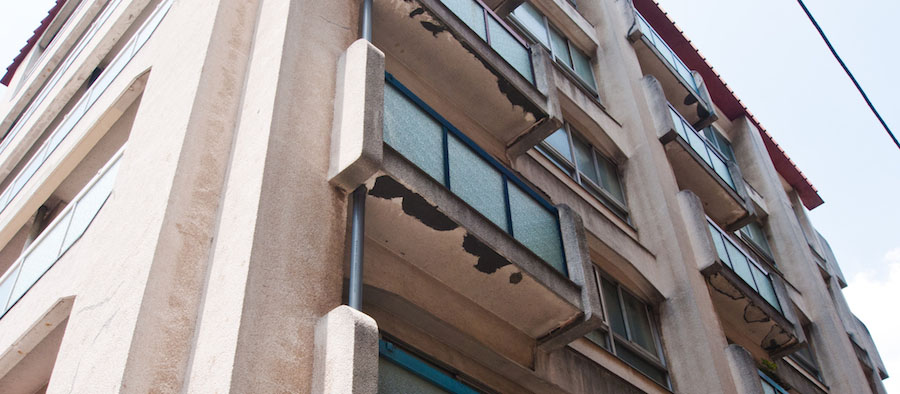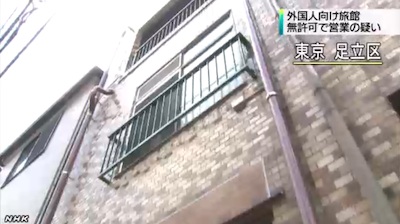Suginami-ku may soon have powers to forcibly widen roads

The local government in Suginami-ku, Tokyo, is considering amending local regulations which would give them the powers to carry out the road widening and street levelling on privately owned setback land. If the plans are approved, this would be the first local government in Japan to have these legal powers.
Approximately 30% of the roads in Suginami are less than 4 meters wide and pose a hazard to the local community in the event of a disaster, such as an earthquake, as emergency vehicles cannot navigate the narrow roads and lane ways.
Under the Building Standards Act, owners of buildings that front onto a road less than 4m wide are required to shorten their block land in order to widen the road when the building is redeveloped.
Suginami’s local government currently provide financial assistance to help owners with the cost of removing any obstacles such as walls and gates in order to complete the required setback. Although landowners are required to make the setback portion of land level with the road, many owners leave the raised curbing as is with garden beds and other objects still blocking vehicle access.
Japan's hot spring towns could be hit hard by new building safety regulations

Since November 2013, large-scale buildings, such as hotels and hospitals, built to the old earthquake-resistant building codes (called ‘kyu-taishin’) are obligated to carry out building inspections to determine their level of earthquake-resistance.
Inspections must be carried out by the end of 2015, after which the results will be made public.
Owners and operators of hot-spring resorts and inns are worried that these requirements could spell the end for their businesses. Towns in these onsen areas that rely on the tourist trade are also worried that this could have a direct impact on their local economy.Read more
Govt relaxes rules on building demolition voting rights and floor-area-ratios

The Japanese House of Councillors have voted in favour and passed a revision to the apartment redevelopment law which will now allow an apartment building association to sell their building and land with approval from 80% of the apartment owners, rather than the previous requirement of 100%.
In addition, the maximum allowable floor-area-ratio (yosekiritsu) will be relaxed.
These changes will hopefully encourage the redevelopment of ageing and potentially dangerous buildings that do not meet current earthquake-resistant standards.Read more
Briton arrested for running illegal lodgings in Tokyo

A British expat was arrested on May 16 for operating a short-stay hotel without a proper license. The 28-year old wanted to offer cheap accommodation for foreign tourists and rented out rooms and bunk-beds in a share-house in Adachi-ku.Read more
12 investors suing their 'dates' after elaborate apartment sales scam uncovered on dating site
Twelve men and women are suing Tokyo-based real estate agencies, apartment sales offices and lending institutions for 200 million Yen in the Tokyo District Court after purchasing over-priced investment apartments at the suggestion of their dates met through online dating sites.
Their 'dates' turned out to be real estate agents who concealed their occupation and allegedly sweet-talked the plaintiffs into purchasing apartments. After settlement, however, their dates ceased all communications.Read more
Cabinet decision to reduce voting ratio to sell apartment building & land
The Cabinet has approved a reform to the apartment redevelopment law which will lower the voting ratio required before an apartment building and land can be sold. Previously, 100% of apartment owners had to be in agreement before the building and land could be sold, but the revision will reduce this ratio to 80%.
It is hoped that the loosening of the regulations will encourage the demolition and redevelopment of ageing buildings and reduce the number of buildings at risk of collapse in an earthquake. It could also open up opportunities for developers to re-purpose the use of the land from residential to commercial.
The decision will be submitted to the ordinary session of the Diet in mid-March and could be enacted within 6 months.Read more
Mgmt association seeks to ban owner from using apartment as sharehouse
 The management association of an apartment building in Azabu Juban have filed a request with the Tokyo District Court to ban a real estate company from operating an 8-room share house out of one of the apartments.
The management association of an apartment building in Azabu Juban have filed a request with the Tokyo District Court to ban a real estate company from operating an 8-room share house out of one of the apartments.
The association believes that the share house configuration violates the condominium ownership law and building standards act.Read more
